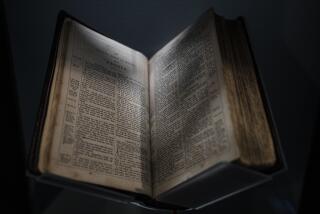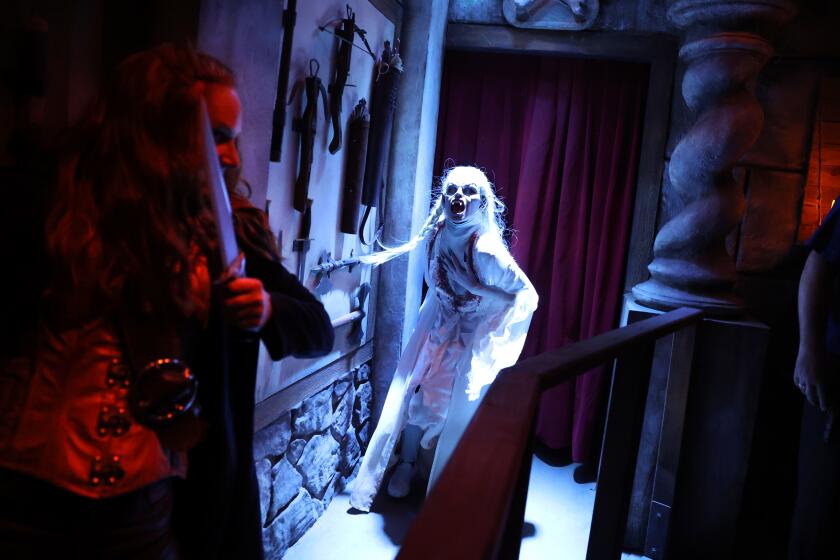Book review: ‘Roger Williams and the Creation of the American Soul’ by John M. Barry
Roger Williams and the Creation of the American Soul
Church, State, and the Birth of Liberty
John M. Barry
Viking: 465 pp., $35
There’s a recurring theme among the religiously political/politically religious that the United States was founded as a Christian nation and that in this modern era we have somehow strayed from God and from our roots. John M. Barry’s new book “Roger Williams and the Creation of the American Soul: Church, State, and the Birth of Liberty” is a counterargument and it is a significant reminder of whence, exactly, this little experiment in democracy of ours came.
Williams, for those who don’t remember their colonial history, founded the European settlement that gave rise to Providence, R.I., in pursuit of the still-gestating idea that people should be able to worship God in individual freedom, not as a dictum of government. In doing so, Barry writes, Williams “created the first government in the world which broke church and state apart.”
While it’s possible that there was some other civilization in the long arc of human history in which religion wasn’t a matter of governance, Williams’ colony apparently was the first time the concept was put into lasting practice within the European sphere. And Barry adeptly traces Williams’ political thought through to the Founding Fathers, who more than 150 years later codified that thinking in the 1st Amendment on the Bill of Rights: “Congress shall make no law respecting an establishment of religion, or prohibiting the free exercise thereof.”
Williams argued that individuals could not be free if they were subject to a government that in turn promulgated a specific religion. He also argued that government receives its authority from the governed, not from God—the common claim of royalty across Europe at the time (and of the Church of England). He also believed that since government is the purview of men (and now women), it had no business interpreting the Bible or matters of faith because “humans would inevitably err in applying God’s law.” That, Williams believed, eventually would corrupt the church itself.
There were other theological differences between Williams and his church and his king. England was still in a long arc of bloody conflict between Protestants and Catholics, and among Protestant sects, with the targets of persecution changing depending on who was on the throne. Williams’ vision of a community in which governance was separated from church was a significant philosophical development at the time, and the evolution of Williams’ thinking as a Puritan minister in England through to his eventual ancillary role in the English Civil War (which began in 1642) is the framework around which Barry builds his book. It takes him a while to get started. Williams, in fact, doesn’t take center stage until Page 137.
But the pre-story is important to understanding the times in which Williams’ political theories evolved. The English High Commission and the Star Chamber condemned uncounted heretics to scarring, maiming and imprisonment under conditions in which “not even the rats ate well.” Many were executed for what were essentially esoteric disagreements over fine points of faith, including whether the cross should be displayed in the church, and whether the Book of Common Prayer should be used.
Williams paid dearly for his radical embrace of the idea of “soul liberty.” He fled to New England in 1630 as agents for the High Commission hunted him down. He moved (sometimes forcibly) among the Plymouth Colony settlements as he distilled and preached his beliefs, until his fellow Puritans prepared in winter 1635 to send him back to England “knowing what would likely happen to him.”
Williams fled into the forest, bought land from the Narragansett tribe (another inflaming belief: that the Puritans should pay the natives for the land they were settling) and established his Providence colony outside the territory claimed by England. Eventually, Providence was awarded a charter by the Crown under which “the form of government established is democratical,” with decisions to be made by a vote of the colonists themselves.
The seed was planted.
Barry, whose earlier books include “The Great Influenza” on the 1918 pandemic and “Rising Tide: The Great Mississippi Flood of 1927 and How It Changed America,” writes with absorbing detail and quotes extensively from 17th century English, a version of the language hard on modern eyes. For instance, there’s this from John Winthrop’s famous “City Upon a Hill” speech to his fellow Puritans as they fled England for the New World:
“But if our heartes shall turne away, soe that wee will not obey, but shall be seduced, and worship and serue other Gods, our pleasure and proffits, and serue them; it is propounded unto us this day, wee shall surely perishe out of the good land whither wee passe over this vast sea to possesse it.”
But patient readers are rewarded. Williams’ views on the relationship between the individual and the state carved out the path to the American future. Most of the early settlers may have been Christians, but by the time the nation was born, the focus was on preserving civil liberties, not faith — establishing a place in which people could, indeed, pursue life, liberty and happiness. And where individuals could define for themselves what that meant.
Martelle is the author of “The Fear Within: Spies, Commies, and American Democracy on Trial.”
More to Read
The biggest entertainment stories
Get our big stories about Hollywood, film, television, music, arts, culture and more right in your inbox as soon as they publish.
You may occasionally receive promotional content from the Los Angeles Times.











